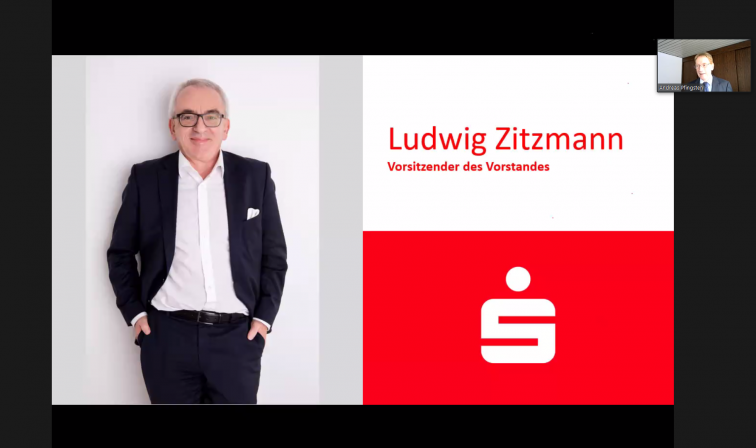Münster Banking Days 2021

On May 6 and 7, 2021, the Münster Banking Days took place in digital format for the first time. High-ranking representatives from the field gathered to discuss pressing issues in the banking world. The impact of Covid-19 was addressed, as well as topics such as digital transformation and changing customer needs. From different perspectives, "Banks' responses to current challenges" were critically examined and discussed.
Ludwig Zitzmann, Chairman of the Board of Management of Sparkasse Oberpfalz Nord, started with the first presentation. He explained how his institution is tackling the digital transformation without compromising on the quality of service. According to Mr. Zitzmann, digital offerings must go hand in hand with high-quality service in the branches and be close to the customer at all times. Mr. Zitzmann saw a prudent, but at the same time creative and courageous approach as necessary so that savings banks can continue to operate successfully in the market.
In the subsequent presentation, Frank Mühlbauer, CEO of TeamBank AG, gave an insight into the transformation of his institution "from a full branch bank to a liquidity specialist". TeamBank AG acts as a service provider for banks and makes the easyCredit consumer loan available to them, among other products. The focus is always on the satisfaction of the end customer and the convenience of the service. The bank takes an example from tech companies such as PayPal. With regard to his own institute, Mr. Mühlbauer also emphasized the importance of a learning culture instead of a culture of mistakes in order to keep pace with the dynamics of the market in the future.
In the subsequent presentation, Dr. Jörg Howein, Chief Product Officer at Solarisbank AG, addressed the growing importance of context-based banking compared to traditional banking. He emphasized that the traditional relationship between customer and bank can be broken down into many individual areas, where FinTechs specializing in these contexts can often offer added value. Dr. Howein highlighted that automation and scalability of processes are particularly crucial for the success of FinTechs.
In the presentation that concluded the first day, Kerstin Berghoff-Ising, member of the Board of Management of Sparkasse Hannover, addressed the question of whether savings banks need to reinvent themselves in light of current challenges. She began by explaining that while banking products per se are interchangeable, proximity to the customer is a key competitive factor for savings banks that cannot simply be replaced by FinTechs. In order to continue to be successful, Sparkasse Hannover relies on omni-channel sales as well as consistent employee development and participation. Ms. Berghoff-Ising expressed her conviction that savings banks with sustainability, lived responsibility and a versatile range of advisory services will continue to play an important role in the market in the future.
On the second day, Eckhard Forst, Chairman of the Managing Board of NRW.BANK, presented the tasks of the development bank against the background of the Corona pandemic. He emphasized that reduced liquidity in the market was a key problem during the past months. NRW.BANK countered this challenge with a broad range of instruments, including deferral options, liability releases and low-interest support loans, and was thus able to help not only established companies but also start-ups and municipalities. Overall, Mr. Forst was cautiously optimistic about economic developments in the coming months.
Karsten John, Managing Director of infas quo, then gave an insight into customer needs in times of and after Corona. He outlined key societal issues that have come to light as a result of the crisis, such as an education and care system in need of reform and outdated climate and transportation policies. Against the backdrop of these challenges, Mr. John saw the role of banks in supporting and attending to societal change.
In the final presentation, Prof. Dr. Joachim Wuermeling discussed the extent to which the Deutsche Bundesbank can support the process of the digital transformation of German finance. He began by identifying three key trends in the digital transformation, namely the fragmentation of the value chain by FinTechs, the proliferation of digital assets and the use of artificial intelligence. Prof. Dr. Wuermeling emphasized that Bundesbank is leading the way by being open to technology in its supervision and investing in its own digital transformation to support the transformation of banks.
As part of the Banking Days, the Ludwig Mülhaupt Prize, endowed with EUR 1,000, was also awarded for outstanding performance at the Finance Center Münster. Our congratulations go to the two students Annika Plenter and Alexander Viets, who impressed with their seminar papers and their performance in the exams and shared this year's prize.
Despite the corona-related restrictions, the Institute of Banking looks back on the very successful event with great satisfaction and is already looking forward to the next Münster Banking Days in 2024.

